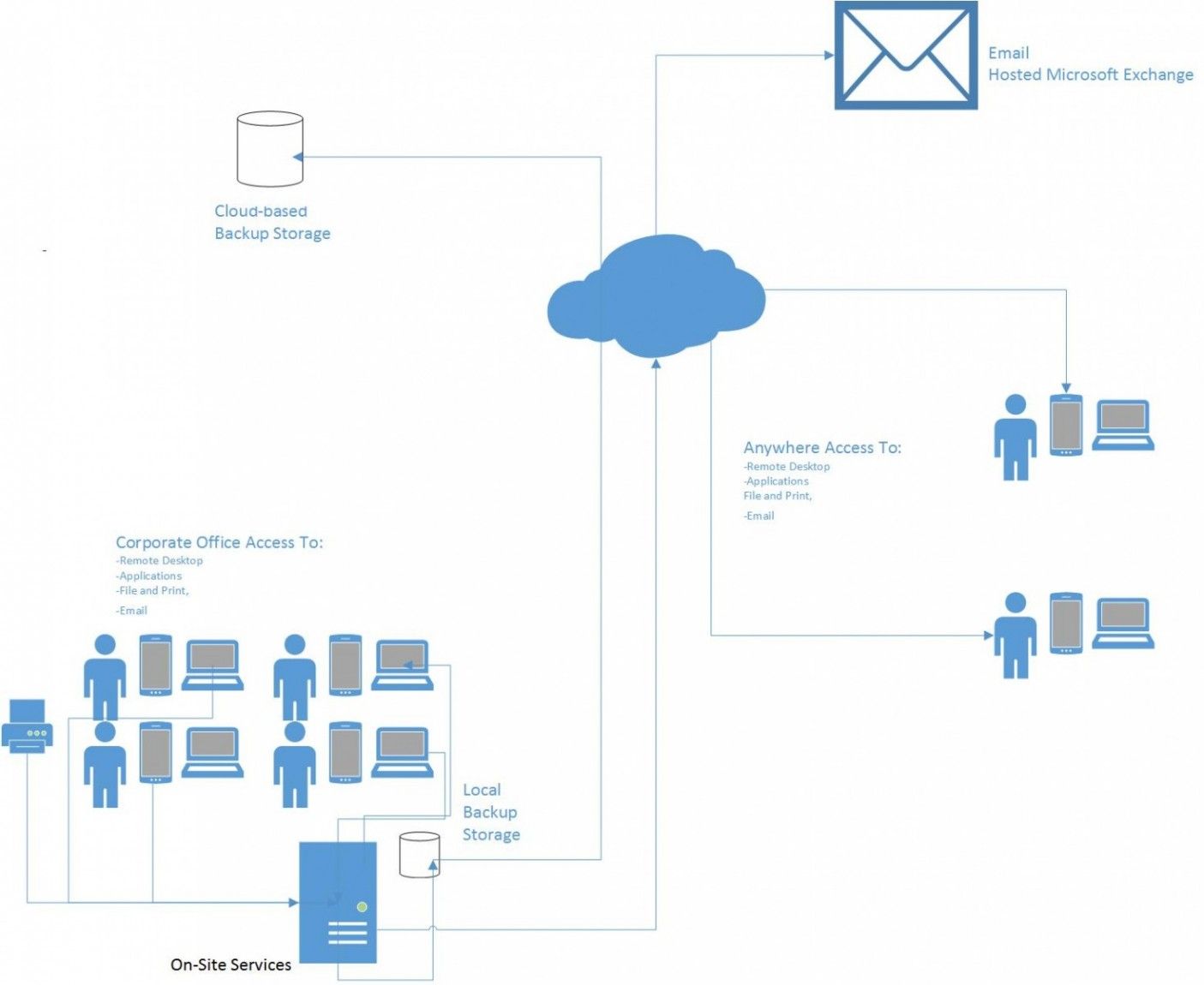The biggest decision is whether to have a cloud based or in house server infrastructure. While it may sound like a black-or-white selection, there are many things to consider. The first factor is how important up-time is to your business. Cloud solutions are usually more expensive than in house, but the benefits of being in the cloud can far outweigh the costs for some businesses. For example, an online business that is reliant on web-based transactions will consider up-time an extremely important factor; therefore, they will likely be willing to pay more for a cloud based solution that can guarantee a certain level of up-time. Other businesses not as dependent on up-time may be more suited to an in house set up.
Cloud based services are becoming more and more popular among small and medium sized businesses owing to the significant reduction of the overall costs for storage and bandwidth associated with cloud computing. Even though the cloud based solutions seems to be the best available cost effective alternative, SMBs should ideally evaluate the impact of cloud migration on a regular basis. There is no one-solution-fits-all model and there is certainly no right or wrong answer whether to choose between cloud hosted or in-house solutions. But these nuggets of information will provide you with the edge while contemplating your decisions.
Security
Security can be considered to be the single most element that is complicated as well as expensive to maintain, especially for small businesses. In a cloud-based service, security solutions will be managed by experts that focus on full-time monitoring and management of security deployment systems. They would ideally adopt the most modern and efficient techniques to safeguard their client’s data as well as their good will. Maintenance of the same level of security would be difficult for small businesses that utilize in-house servers. But with cloud based solutions, SMBs can also avail the same security benefits like their competitors.
Hosting
Whether to host critical business application on cloud or not is an increasingly compelling dilemma. The ease of availability and accessibility of business applications and services over the internet through web browsers benefits employers as well as employees with flexibility, reduced costs, instant installations and simplified maintenance. While considering in-house solutions for hosting applications and services, availability, data portability, expenses and interoperability will have to be compromised.
PROS AND CONS OF CLOUD SERVERS
| Pros | Cons |
|---|---|
| No need for onsite hardware or capital expenses. Well suited to rapidly growing companies that may outgrow their infrastructure too quickly. | The user experience is limited by the speed of the Internet connection. |
| Easily scalable; can be added to as needed. Solutions are often on-demand, so you only pay for the options you want. | Third party cloud services could have direct access to your data. |
| Workers can connect from anywhere, using any computer, tablet, or smartphone. Companies can implement BYOD (bring your own device) policies. | If the Internet goes down on your side or on your cloud provider’s side, you won’t have access to any of your information. |
| Data can be backed up in the cloud as regularly as 15-minute intervals, minimizing data losses in disaster situations. | The costs can outweigh the benefits for companies not as dependent on uptime. |
PROS AND CONS OF IN HOUSE SERVERS
| Pros | Cons |
|---|---|
| Gives you physical control over your server. | Requires a capital investment in hardware and infrastructure. |
| Keeps critical data in-house; no third party has access to your information. | Requires space in your office for rack space or a server room/closet, as well as dedicated IT support. |
| No need to rely on an Internet connection for access to data. | May be more susceptible to data loss during disaster situations due to in-house location. How often you take the data offsite will reflect how much data you’ll lose in an emergency. |
| Can be more cost-effective for companies that are not as concerned about uptime. | No uptime guarantees. |
In-House Servers
The Cloud wasn’t even a viable option for small and medium-size business (SMBs) a few years ago. So historically, SMBs have used in-house servers (meaning one located within the company) to host applications, file sharing, email and other office essentials. But even now that the Cloud is an alternative, sticking with an on-site server may still be the best bet for your SMB. Here are a few reasons why.
When your server is in-house, you have complete control over it. You don’t have to rely on a Cloud service for security and you can build a solution that’s tailed completely to the needs of your business. Plus, you can upgrade your server to meet the needs of your company as it grows or changes and you won’t pay monthly hosting fees.
On the downside, an in-house server requires a sizable initial capital investment into equipment and software. You’ll also pay for at least a part-time IT professional and be responsible for the costs associated with renewing software license and hardware upgrades.
Hosted Cloud Servers
Just like an on-site server, a Cloud-based one offers a number of advantages and a few drawbacks. If your SMB has a high percentage of virtual workers or demanding internal IT costs, a Cloud server could save your company money. Additionally, with the Cloud, you’re relived of the stress of managing the server. This is particularly useful for businesses that can’t afford a dedicated IT staff member or those SMBs that would prefer to use the capital that funds a hefty IT salary in other ways. Another pro of a Cloud server is that it offers an easily scalable solution that can be modified to meet the changing demands of your business. For example, because you don’t purchase software, you’re more likely to upgrade when necessary.
On the downside, a Cloud server requires a dependable Internet connection. If Internet access is down, you won’t be able to connect to your server. Although Cloud servers have a reputation for being highly secure, you may hesitant to use the Cloud if your company handles especially sensitive information like customer’s health records or financial data. When considering a Cloud server you can’t overlook the cost of monthly hosting fees, so make sure your business is prepared for that expense.
The Hybrid Model
Today, IT professionals are eager to focus on acquiring the best of both worlds, which is taking advantage of the possibilities that a hybrid or multiple solution offers. The hybrid solution allows the business owners to maximize their benefits from both cloud hosted as well as in-house server models. To adopt a hybrid approach, the small businesses can choose to migrate only critical applications or services to cloud. You will still have complete control over your on-premise applications and services which enables you to choose the best options depending on your business as well as infrastructure requirements.

Benefits of 3rd party “cloud” services:
- Predictable monthly recurring expenses.
- Ease of adding capacity for your business to grow.
- “Renting” a small piece of a highly reliable system that would be too expensive to replicate on your own.
- Issues you may experience with the provider may be their responsibility to resolve.
- In the case of backups, you don’t have all of your eggs in one basket.
Breaking it Down: In-House vs. Cloud Servers
An on-site server gives you physical control over your server and it can be developed to meet the specific needs of your business. It also keeps critical data in-house. However, the initial cost to set up the server and the cost of maintaining it are sizable. Plus, you’ll be entirely responsible for paying for IT support whenever you may need it, which can make budgeting a nightmare.
When you move to a Cloud server, your on-site investment is negligible, you’ll enjoy enhanced scalability over an in-house server and it’s great for business with several virtual workers. You must have a strong, reliable Internet connection and you’ll have to budget for monthly hosting fees. Additionally, you must feel comfortable giving up control of data security, but there are trusted options out there to take care of this for you.
So should you go the traditional route and use an in-house server (or upgrade the one you have) or subscribe to a Cloud server? As with many business solutions, the answer depends on your business’ specific needs and budget. And while the Cloud has captured media buzz, according to a 2013 study by research firm Colmar Brunton, only 16 percent of small and medium business operators (SMEs) surveyed use Cloud computing. However, those SMEs that embrace the Cloud were over 100 percent more likely to enjoy increased revenue over the past year than those who didn’t.


